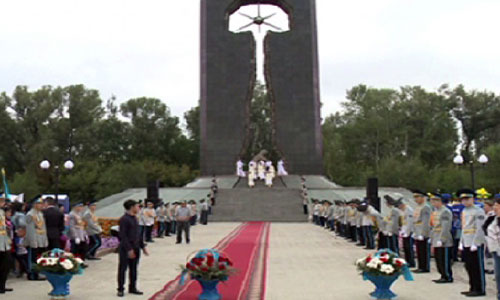Every year on August 29, the world celebrates the International day against nuclear tests, approved by the UN General Assembly resolution on December 2, 2009. A draft resolution on this issue has been proposed by Kazakhstan. 26 States co-sponsored the resolution.
It was on August 29, 1991 that the Semipalatinsk nuclear test site was officially closed by the decree of the President of Kazakhstan Nursultan Nazarbayev, which was the beginning of the process of Kazakhstan’s refusal from one of the world’s largest arsenals of nuclear weapons.
The former Semipalatinsk nuclear test site was established in 1949 specifically for testing the Soviet nuclear device. From 1949 to 1989, 468 nuclear tests were carried out at the site. The total power of these nuclear charges is 2.5 thousand times more than the power of the atomic bomb dropped on Hiroshima.
Shortly after the proclamation of Kazakhstan as an independent state, President Nursultan Nazarbayev signed a Decree on the closure of the landfill. About 1.3 million people were officially recognized as victims of the tests at the site. It is in the East Kazakhstan region, where the Semipalatinsk test site was located, still, high mortality, critical level of cancer, many children are born with pathologies, life expectancy here does not exceed 50 years.
The International day against nuclear tests is intended to educate and inform people more actively about the consequences of nuclear test explosions and any other nuclear explosions and the need to stop them.
The resolution of the UN General Assembly noted that «it is necessary to make every effort to put an end to nuclear testing and thereby prevent adverse consequences for the life and health of people and the environment...the complete cessation of nuclear tests is one of the key means of achieving the goal of a world free of nuclear weapons».
The first International day against nuclear tests was held in 2010. Since then, every year this Day is celebrated by holding a worldwide, concerted activities, including symposia, conferences, exhibitions, competitions, publications, and lectures in academic institutions, information transmission, etc.
On August 29, 2012, President of Kazakhstan Nursultan Nazarbayev speaking at the International parliamentary conference in Astana, launched the «ATOM» project in order to obtain global public support for the final cessation of nuclear tests, and, ultimately, the complete elimination of nuclear weapons. To date, more than 300 thousand people around the world have signed an online petition of the «ATOM» project.
In addition, the Head of state stressed that the most important initiative created at the suggestion of Kazakhstan forum «G-GLOBAL» should be the acquisition of humanity’s freedom from fear of nuclear self-destruction. In particular, a step-by-step Plan for a comprehensive reduction of strategic offensive arms with the participation of all nuclear States, developed and adopted under the auspices of the UN, is needed. It was important to achieve the entry into force of the nuclear-test-ban Treaty. It is also necessary to develop mechanisms of promotion of States that had cancelled their military nuclear programs.
To this end, in 2009 the Republic of Kazakhstan took the initiative to host the International Bank for low enriched uranium (IBLEU) under the auspices of the International Atomic Energy Agency (IAEA). Kazakhstan and the IAEA signed an agreement on the establishment of the IBLEU in Astana on August 27, 2015. This is the first such Bank in the world, whose task is that if a member state of the IAEA is not able to acquire low-enriched uranium for its nuclear energy, it may ask the IAEA to ensure the supply of this material.
The official opening ceremony of the IBLEU was held on August 30, 2017 in Astana with the participation of President of Kazakhstan Nursultan Nazarbayev and IAEA Director General Yukiya Amano. The Bank itself is located on the territory of Ulba metallurgical plant in Ust-Kamenogorsk in the North-East of Kazakhstan. To own the fuel Bank and will be controlled by IAEA, and it will be operated by Kazakhstan. Safety issues will be governed by Kazakhstan’s legal requirements and the Bank will comply with all applicable IAEA safety standards.
In his speech at the event, President of Kazakhstan Nursultan Nazarbayev stressed: «Over the years of independence, we have made a rapid way from the possession of the world’s fourth Arsenal of nuclear weapons to the leader of global non-proliferation of these weapons. Kazakhstan has become a trusted partner of the IAEA is the only UN body responsible for peaceful nuclear energy».
Thus, from the first days of state independence the Republic of Kazakhstan and its Leader Nursultan Nazarbayev consider the achievement of a global nuclear - free world to be their main strategic goal in the international arena. For the early realization of this noble goal of Kazakhstan and its President spend most of the peacekeeping work that welcomes and supports all progressive mankind.
Home » Opinion » Global Peace Initiative of Kazakhstan
Global Peace Initiative of Kazakhstan
| By Hadi Ahmad Bargasht

